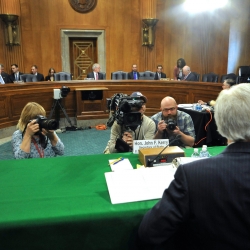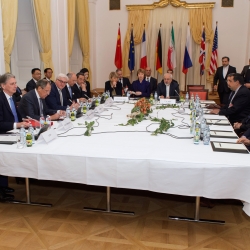Partisan Republican Actions Damaging U.S. National Security
Partisan Republican Actions Damaging U.S. National Security March 11, 2015 The letter on the Iran negotiations by Sen. Tom Cotton (R-AR), signed by 46 of his Senate Republican colleagues, is the latest and most blatant example of what is becoming an emerging pattern of Republican partisanship that expressly works to undermine U.S. foreign policy and national security. More than just an embarrassing political stunt, Sen. Cotton’s unprecedented letter will damage U.S. international credibility and weaken the United States’ ability to conclude a deal that would prevent Iran from obtaining a nuclear weapon. This willingness to put short-term political goals ahead of U.S. interests has been on display with other Republican initiatives in recent weeks, particularly Speaker of the House John Boehner’s (R-OH) efforts to circumvent… Read More ›










